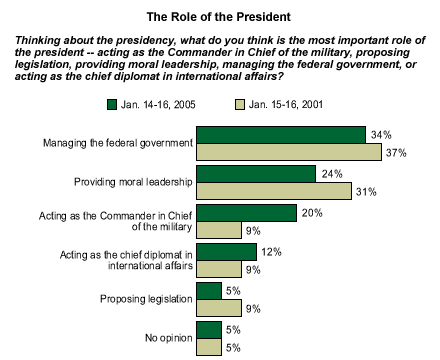During his inauguration speech two weeks ago, President George W. Bush outlined an ambitious agenda for his second term in office. Much of it focused on foreign policy. Suffice it to say, Bush's agenda has changed significantly with the social and political landscape of the country since his first inauguration in January 2001. Accordingly, public opinion about the most important role the president plays has shifted somewhat since then, too.
A CNN/USA Today/Gallup Poll* conducted shortly before Bush's inauguration asked Americans what they think is the most important role the president plays. Of the five options respondents were given, "managing the federal government" tops the list, with roughly a third (34%) of Americans saying that role is most important. A quarter (24%) of Americans say "providing moral leadership" is the president's most important role, while another 20% choose "acting as the commander in chief of the military." Rounding out the list are "acting as the chief diplomat in international affairs" (12%) and "proposing legislation" (5%).

Changes Since 2001
Gallup asked this same question just before Bush's 2001 inauguration. Although managing the federal government was the most common response in both years, there have been some important shifts from four years ago. This year, most likely because of the country's embroilment with the war on terror and the war in Iraq, twice as many respondents choose the president's status as military commander as his most important role (20% compared with 9% in 2001).
Fewer Americans say providing moral leadership is the president's most important role -- down to 24% from 31% in 2001. Bush's use of a moral platform in his first campaign may have strengthened perceptions of the importance of that role. And as memories of the Bill Clinton-Monica Lewinsky affair become more distant, the public's priorities for the president have shifted to more immediate concerns such as national security.
Politics and Priorities
Republicans and Democrats differ substantially in their views about the president's role. Republicans are much more likely to think the Commander in Chief role is most important; 30% of Republicans say so compared with 17% of independents and 14% of Democrats. Republicans are also more likely to emphasize the president's moral leadership -- 28% of Republicans choose this option, compared with 22% of independents and 20% of Democrats.
On the other hand, Republicans are less likely than independents or Democrats to emphasize the president's role of managing the federal government. Twenty-seven percent say managing the government is Bush's most important role, compared with 37% of independents and Democrats. Republicans also discount the president's role as a diplomat. Just 4% think acting as the chief diplomat in international affairs is the president's top role, compared with 14% of independents and 18% of Democrats.
*These results are based on telephone interviews with a randomly selected national sample of 1,012 adults, aged 18 and older, conducted Jan. 14-16, 2005. For results based on this sample, one can say with 95% confidence that the maximum error attributable to sampling and other random effects is ±3 percentage points. In addition to sampling error, question wording and practical difficulties in conducting surveys can introduce error or bias into the findings of public opinion polls.
